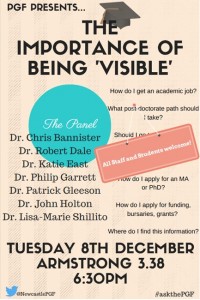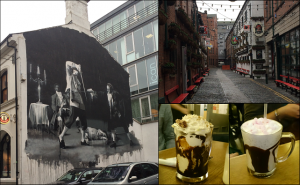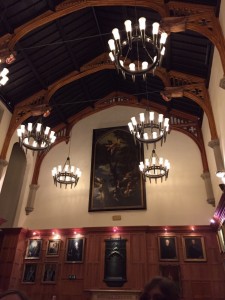By Sam Petty (PhD History)
Tuesday 8th December, 6.30pm, Armstrong 3.38: “The Importance of being ‘Visible'” question and answer session.

I’m sure many of you would agree that academic life can be a fairly bewildering experience. Trying to get on with your research is a difficult enough enterprise in its own right. When you factor in applying for conferences and funding, planning research trips, and partaking in the oft-maligned practice of ‘networking’, it can all seem a bit too much.
The idea for this event came from several discussions about the value of the advice that our more experienced colleagues can give to us. My own experience of organising an academic conference for the first time was made much easier by being able to repeatedly saunter over to a colleague’s desk and ask her how she’d done things for her conference the year before (“never underestimate the frequency and cost of refreshments”). Equally, being able to pitch my conference paper to non-specialist colleagues was a great way to learn how to get my argument right for an audience that would only know the basics of my research.
I also wish that I knew things ‘then’ that I know now. I wish I could go back and tell undergraduate me what it would be like doing a Masters. I wish I could go back and tell the Masters me how the PhD funding and application process was structured. I wish I could go back and tell first-year PhD me not to spend six months on a mostly fruitless research thread that I still haven’t fully resolved.
The point is, is that although I have had to learn things through trial and error, it doesn’t mean we need to perpetuate this cycle of misery (there’s only so much ‘character building’ I can take). I’d like to give advice to other students who went through the same experiences as I did. I’d also like to talk to some of our academics so that I don’t make the same mistakes as they did when they were at the same point in their career.
Sometimes it seems, however, that there is rarely the right forum to receive (and give!) this sage knowledge – there are only so many times you can ambush someone in the corridor or the staff room before you feel like you’re unduly imposing on their time and freedom of movement!
With this in mind, the Postgraduate Forum have teamed up with several of the School’s academics to try and help you navigate the murky byways of academic life.
Our academic panel will consist of Dr. Chris Bannister, Dr. Robert Dale, Dr. Katie East, Dr. Philip Garrett, Dr. Patrick Gleeson, Dr. John Holton, and Dr. Lisa-Marie Shillito. We hope that this group represents the different disciplines in our School, so that there will be something relevant and representative for all of us who attend. Our panel will take questions from the crowd, and then when we’ve drained their knowledge (but hopefully not their patience), we can all just meld into informal groups to carry on the conversation.
Use the hashtag #AskThePGF to get your questions in before the event (although there will be time at the event to ask any you might have.
This is an event is for any students that are interested in attending, not just PhDs. This includes any Masters or MLitt students who are thinking about ‘the next step’, or any UGs who are contemplating postgrad study. We’re hoping for a useful, inclusive, and informal event that will hopefully set the ball rolling for more interaction in the future.


